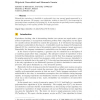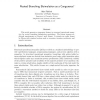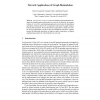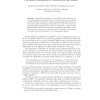132
click to vote
FSTTCS
2010
Springer
15 years 3 days ago
2010
Springer
Bisimulation equivalence is decidable in polynomial time over normed graphs generated by a context-free grammar. We present a new algorithm, working in time O(n5 ), thus improving...
IANDC
2010
15 years 20 days ago
2010
Simulation preorder/equivalence and bisimulation equivalence are the most commonly used equivalences in concurrency theory. Their standard definitions are often called strong sim...
TCS
1998
15 years 1 months ago
1998
We prove that bisimulation equivalence is decidable for normed pushdown processes.
102
click to vote
JCSS
2000
15 years 1 months ago
2000
This article presents a congruence format, in structural operational semantics, for rooted branching bisimulation equivalence. The format imposes additional requirements on Groote...
102
click to vote
TCS
2008
15 years 2 months ago
2008
We show that the class of Petri nets is less expressive with respect to bisimulation equivalence than the class of PA processes extended with a finite state control unit. Key word...
100
click to vote
GG
2008
Springer
15 years 3 months ago
2008
Springer
Abstract Synchronising Graphs is a system of parallel graph transformation designed for modeling process interaction in a network environment. We propose a theory of context-free s...
137
click to vote
LICS
1991
IEEE
15 years 5 months ago
1991
IEEE
Baeten, Bergstra, and Klop (and later Caucal) have proved the remarkable result that bisimulation equivalence is decidable for irredundant context-free grammars. In this paper we ...
111
click to vote
CONCUR
1995
Springer
15 years 5 months ago
1995
Springer
We develop a theory of bisimulation equivalence for the broadcast calculus CBS. Both the strong and weak versions of bisimulation congruence we study are justi ed in terms of a cha...
151
click to vote
CONCUR
2003
Springer
15 years 7 months ago
2003
Springer
We present a process-algebraic language for Probabilistic I/O Automata (PIOA). To ensure that PIOA specifications given in our language satisfy the “input-enabled” property, w...
126
click to vote
CONCUR
2009
Springer
15 years 8 months ago
2009
Springer
Bisimulation equivalence is decidable in polynomial time for both sequential and commutative normed context-free processes, known as BPA and BPP, respectively. Despite apparent sim...




